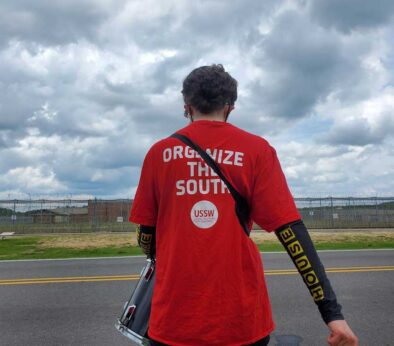
SPRINGVILLE, Ala.—The dry Alabama heat hung in the air as activists and organizers from across the Southeast gathered down the road from St. Clair Correctional Facility in Springville, Ala., on May 18. For some, it was their first time, but for others in organizations such as the Tennessee Student Solidarity Network, it was one of many rallies they had attended outside this Alabama prison. The reason for this rally was similar to the many that had preceded it: to demand an end to the state’s work release program, which many unions are calling modern-day slavery.
In December 2023, ten former and current inmates filed a lawsuit against the Alabama Department of Corrections (ADOC) and several public officials including Gov. Kay Ivey. The convicts do not stand alone in their lawsuit, with labor unions such as the Retail, Wholesale, and Department Store Union (RWDSU) and the Union of Southern Service Workers (USSW) signing onto the suit as well.

While unions and student organizations have aggressively organized on the outside to demand an end to this forced labor scheme, organizers on the inside of the concrete walls and barbed wire have worked even harder, mainly organizing behind the Free Alabama Movement (FAM). First organized out of St. Clair in 2013 by leaders such as Melvin Ray, FAM has led several strikes and work stoppages—not only in Alabama but across the entire United States.
Free Alabama Movement
In 2014, FAM led two statewide strikes, both calling for an end to dangerous conditions in Alabama prisons, over sentencing, and ending the state’s work release program. By 2016, the strength and reach of FAM had grown, and that year on Sept. 9 the prison-based organization led a nationwide work stoppage that saw 24,000 inmates in 12 states not show up for work that day. It was the largest prison strike in the history of the United States, but eight years later, deplorable conditions continue to this day across the Deep South state.

At the time, FAM did not release a unified list of demands for these strikes, rather opting to let state strikers make their own demands. In states like Michigan and South Carolina, prisoners went on strike to demand an end to understaffing and inhumane living conditions.
According to videos posted to the FAM YouTube page, cells running rampant with roaches and rats are common. Additionally, cell phone footage showing guards violently beating inmates reveals the brutal life that those living in the ADOC’s facilities endure and witness every day. In 2022 alone, 274 inmates died while incarcerated in Alabama prisons, with close to a third of these deaths being the result of homicide, suicide, or overdose.
Despite the overwhelming lack of humanity inside the prison walls, FAM continues to organize, now with the backing of several student and labor groups across the Southeast.
At the prison gates
Converging from Georgia, Tennessee, and Alabama, a group of about 20 activists rallied across the street from St. Clair on May 18 to show their support for the inmates inside who are forced to work every day. In prisons across the state and country, it is common for inmates to work in on-site prison facilities that produce license plates or work in laundry and cooking facilities.

However, in some prisons, such as St. Clair, inmates work for private corporations outside prison walls such as Burger King, Wendy’s, Raytheon, and local meat plants.
The rally kicked off with various activists meeting about half-a-mile down the road from the remote Alabama correctional facility. Just 30 minutes outside of Birmingham, farms and pastures peppered between new suburban developments dotted the flat grassy landscape.
Speaking over the rattling buzz of countless cicadas, organizers hugged those with familiar faces while introducing themselves to newer ones. Medics made sure to hand out water to everyone for the journey up the road to St. Clair. It would be about a 20-minute walk to the prison, and in the heat of the Alabama summer, the protesters took every precaution when it came to hydration.
“Abolish slavery!” was one of the main chants of the slow but steady march along the grassy roadside. The suit against ADOC filed by unions such as USSW aims “to abolish a modern-day form of slavery” that forces inmates to work jobs for little to no pay at all.
After marching past the staff gun ranges across the street from the prison, organizers marked out their territory just 20 yards from the maze of barbed wire surrounding St. Clair. An unmarked police car down the road from the rally rolled down its windows, revealing a lone officer snapping photos of the demonstrators before slowly driving off.
Members of the different organizations spoke, addressing both the crowd and the inmates inside the walls. Representatives of La Luta Sigue, a Tennessee-based progressive movement incubator, spoke directly to the people trapped inside the towering concrete walls of the ADOC.
Dedication, passion, and encouragement spilled over in their words, pleading with the inmates to not give up but rather to persist in their fight against the conditions inside the prison. Several union representatives, such as Evette of the Teamsters LGBT Caucus, spoke at the rally, as well. Evette told the crowd of the Teamsters’ past victories, specifically winning a contract for UPS workers in 2023, driving home the message that when workers fight and organize, they win.
Members of the USSW, one of the unions to sign onto the suit, took to the bullhorn as well. The service workers told their own stories of workplace abuse, but in classic union style, they turned these stories of sorrow into triumph through the power of organizing. All in all, the message of hope pierced through the thick Alabama heat. Solidarity was the tune of the song that the activists played as they continued to chant and rally before packing up and heading back to the original meeting spot just down the road.
Recharging for the next battle
After a blistering hot day in the Alabama heat, the only remedy for the worn-out activists was tacos and margaritas at the local Mexican restaurant in small-town St. Clair. As the coalition of men, women, and gender-diverse protesters filled up on carnitas and rice and beans, they made sure to congratulate each other on the hard day’s work they had put in.
They made sure to remind each other to pass out and distribute the union’s petition against the ADOC in their respective communities. The rally was not the first of the coalition’s action, and it wouldn’t be the last, signified by the united chant of “We’ll be back!” as the group marched away from the prison.
After filling up on much-needed nutrition, the coalition members hugged each other goodbye, with the bittersweet knowledge they would be seeing each other again. They promised each other to keep showing up until the ADOC’s slavery is abolished. While they couldn’t claim victory that day, with the power of unions, students, and incarcerated people teaming up, they knew the day would come when they could celebrate together and leave slavery behind.










